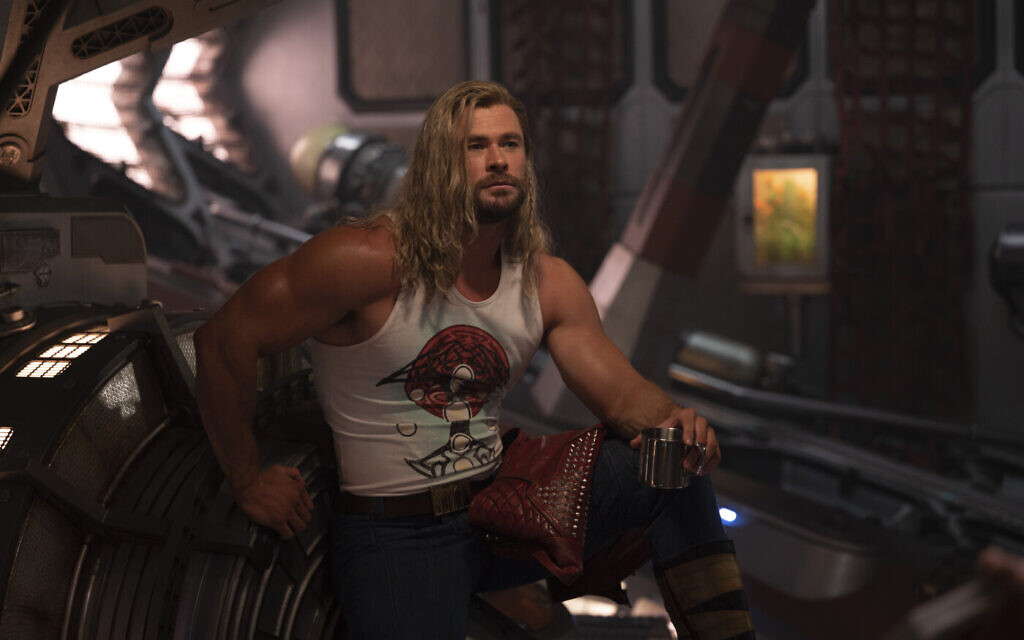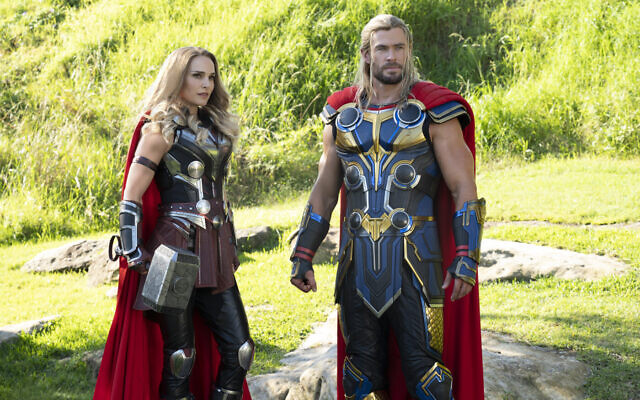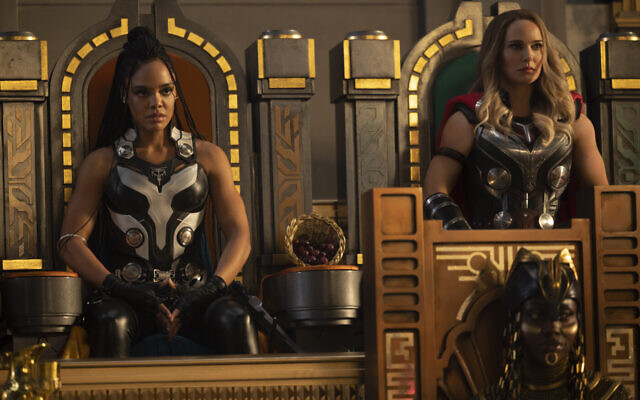Now in theaters, the latest soon-to-be blockbuster is entertaining – but with repetitive jokes and a juvenile tone, it’s not bad that it’s the franchise’s shortest feature in years

NEW YORK — The assembled work of the Marvel Cinematic Universe has been printing money and dominating culture since it began in 2008, but there’s been one noticeable thing lacking these last eight years. The Israeli-born, Oscar-winning actress Natalie Portman has been absent since her appearance in “Thor: The Dark World” in 2013.
With Jewish-Maori writer-director Taika Waititi’s “Thor: Love and Thunder” she isn’t simply back, this time she’s wearing the Asgardian armor, zooming through spacetime, and wielding Mjölnir, the charmed hammer that can only be held by one worthy enough to possess the power of Thor. But we’ll get to that.
When we first catch up with Portman’s brilliant astrophysicist Dr. Jane Foster, we see her career has been ascendant since she and the Norse God of Thunder broke up. Her published work on wormholes (which she refers to by their more Jewish-sounding name of “Einstein-Rosen Bridges”) is popular enough that she sometimes spots people reading her book. Unfortunately, this little victory happens when she is killing time during a lengthy chemotherapy treatment.
Sadly, Dr. Foster has stage four cancer, and the prognosis is quite poor. (Allow me a moment to say, in all seriousness, that Ashkenazi Jews have a much higher chance of carrying the BRCA gene, which can greatly increase the risk of women’s cancers; early detection is a key measure of prevention, so do get yourself checked out if you fit that description.)
When it seems as if all hope is lost, she senses a “calling” from the broken pieces of Thor’s old weapon Mjölnir, which now live under glass in “New Asgard,” a Scandinavian town of interstellar refugees that doubles as a Disneyland-esque tourist attraction.
In her presence, the mighty hammer reassembles itself and restores Jane to full health, which also means bulking out her arms and giving her hair gorgeous blonde highlights.

Not just that, her newfound role as Thor (not “Lady Thor” or “She-Thor,” but another Mighty Thor) has her bashing baddies and saving the day alongside her ex-boyfriend, that gorgeous gentile from outer space, the original Thor, played by the very entertaining and ridiculously fit Chris Hemsworth. And while it is evident from their first reunion that there is still the rumble of love between them, her new godly powers are sapping her life-force, so whenever she puts down the hammer, she is even closer to death.
Why is this happening? And why can’t she just fuse the hammer to her body full-time? I can’t give you a real answer. What you must understand is that “Thor: Love and Thunder” is, more even than most Marvel projects, a movie for kids that zips by at light speed, more interested in going for a quick laugh and evoking a cheer than making a lick of sense.
This makes for some entertaining viewing, but also can be a little tiring. One joke about Thor’s new weapon, an axe called Stormbreaker, being jealous of Mjölnir’s return to the scene is funny. By the 20th, it’s overkill. Waititi’s laid-back style, which he employed to better ends in “Thor: Ragnarok,” favors a surface humor that is overly reliant on an off-the-cuff delivery of unexpected juxtapositions and exaggerated reaction. You don’t expect a battle-ready hunk like Chris Hemsworth to get tongue-tied or lose his confidence, so that’s the gag in every scene.
These comedic reversals work well on, say, “The Office,” but for an action-adventure movie, it should be a garnish, not the main meal. Sadly, there’s very little at stake in this movie, and almost no forward momentum. It’s just goofin’ around. Usually, I am loathe to get up during a film to use the restroom or buy a pack of Twizzlers — but this is one where, quite frankly, a quick three-minute break might do it some good.
Beyond the jokes — and the considerable screen presence of our two leads looking gorgeous — is a rote script about a baddie (played by Christian Bale) on a rampage killing gods who must be stopped. This leads to an amusing scene set in Omnipotence City, a pantheistic realm where deities from all cultures — Mesoamerican, Egyptian, Rock People, Giant Eyeballs — congregate to cheer each other and talk about orgies. (I swear this is a kids’ movie, these stray lines will fly past them.) It’s here where a rather puffy Russell Crowe appears as Zeus with an absurd Greek accent. There is also a plot about kidnapped children in a cage made of bones hurtling through space (really, I’m serious, this movie’s for kids) and Tessa Thompson’s character Valkyrie shows up from time to time on a winged horse.
The battle scenes mostly look like video games, but are cut together with a fun ’80s rock score (a lot of Guns N’ Roses, a little Dio) and there’s a clever bit where the action enters a realm of shadow, so the movie is literally drained of its color. Some of the creatures have a Ray Harryhausen-like retro simplicity that is delightful. And those tormented kids ultimately steal the show from the grown-ups in the big finale.

By now everyone knows to stick through a Marvel movie all the way to the end. I won’t say who, but a newly popular British-Jewish actor is teased as an upcoming foe for Thor, and should anyone find the conclusion of the film a little too emotional, there’s a grace note before the final cut to black that acts as a little kiss on the forehead.
It’s very hard to dislike a movie in which space Vikings cruise through galactic dust on a literal amusement park ride pulled by enormous braying goats. But I wish Taika Waititi was a little more trusting of his own comedy. This was also evident in his last picture, “Jojo Rabbit,” the anti-Nazi film that won him an Academy Award for Best Adapted Screenplay. (I hereby voice my dissent!) His personal brand, to me, it is to scream THIS IS MEANT TO BE FUNNY at full voice, thereby cutting the actual humor by half. By the end of “Thor: Love and Thunder,” you may feel as if Waititi’s hammer is hitting you over the head.
As reported by The Times of Israel
